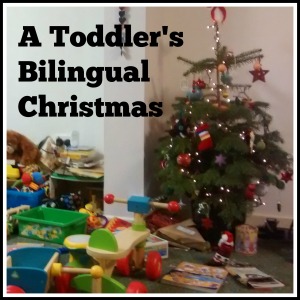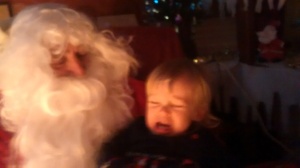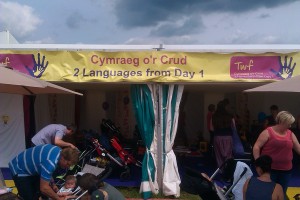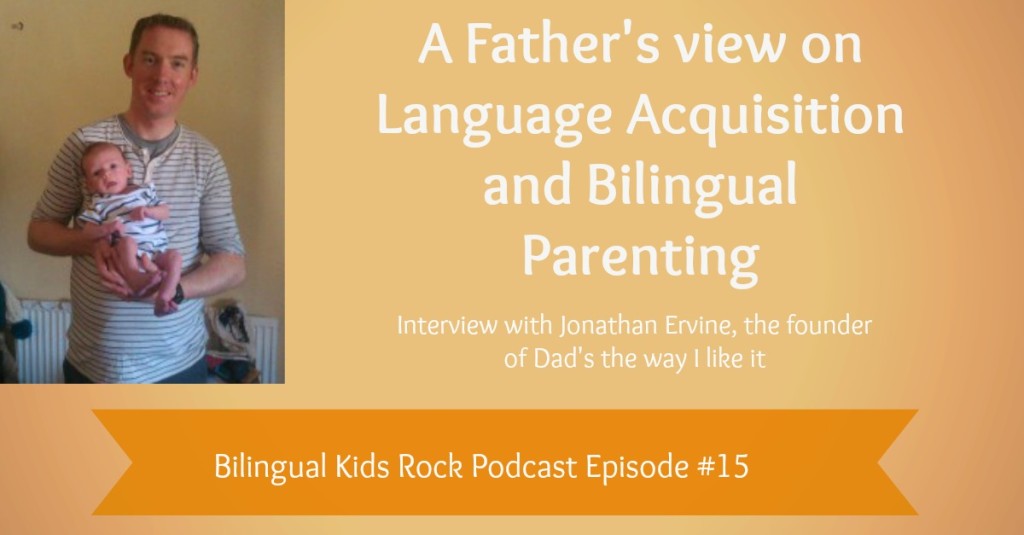During the Christmas and New Year holidays it was fun to spend more time with our son and see how his language skills in English and Welsh have been developing. As I mentioned in one of my first posts about bilingualism, my wife speaks to our son in English and I speak to him in Welsh.
While my wife was at a Mindfulness course on one of the last few Saturdays before Christmas, I took our son to a few Christmas events near where we live in North Wales. To start, we went to a butterfly farm on Anglesey where Santa Claus was making a Christmas visit. The fact that we’ve visited this attraction several times in the last few months probably explains why ‘pili pala’ (butterfly) became the first word that our son has said in Welsh before he had come out with the English equivalent.
Our son was a bit scared about going into Santa’s grotto with me and seemed to also be unsure about meeting Santa Claus, despite the fact that this Santa Claus clearly knew me. After having a chat with us in Welsh about Christmas, the bearded gift-giver then asked in Welsh ‘is dad going to be on the radio talking about the football again this afternoon?’. It seems that Mr. S. Claus is a regular spectator at Bangor City, where I regularly provide an online audio commentary on the home games that reaches supporters in far-flung locations such as the USA, the Cayman Islands, New Zealand and southern parts of Wales. I am still trying to work out where and when I’ve talked to this Santa at the football as he certainly dresses differently at Bangor City’s home games.
After our trip to meet Santa and a load of butterflies, our next stop was Caernarfon for a Christmas event being hosted by a fantastic local book store than sells a brilliant range of books in both Welsh and English. All day, there were fun activities for people of all ages. Just after we’d had lunch, we saw a concert by local band Plu who had just released a new Welsh language CD of songs about animals for kids. We now play this song in the car, which adds some welcome variety after the previous car CD of choice featuring a ditty about a ‘dingly dangly scarecrow’ had become a bit repetitive.
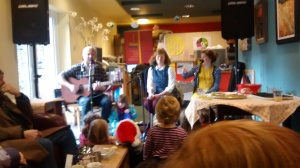
Thankfully our trip to watch the band Plu sing some songs for kids in a local bookshop didn’t produce the same reaction as being introduced to Santa.
After this excitement, our son decided that it was time for a nap rather than a trip to watch our local rugby team. As I have a distinct preference for football (a.k.a. soccer) over rugby, I was pleased to see that he had his priorities right. Last time we went to a football match, he made sure that he got in his nap before the game. When he had woken up again, we headed to the Bangor Christmas market where our son seemed particularly interested in the Christmas lights. However, shortly after pointing towards the festive illuminations he started saying ‘seagull’ in a gesture that demonstrated a greater fascination with local birds that the decorations.
During the Christmas holidays, I was really struck by how rapidly our son’s English vocabulary was expanding. Whilst this was great, I did wonder how long it would be before he started coming out with lots and lots of new words in Welsh (the language that I use when speaking to him). As my wife spends more time with our son during the week and mainly speaks English to him, it’s probably natural that his English vocab seemed to be increasing so noticeably. That said, our son has been able to do quite a good job of pronouncing the LL and CH sounds in Welsh for a few months now!

Despite being good at pronouncing LL and CH sounds, our son hasn’t yet managed to say the name of this local train station.
During the Christmas and New Year break, I was really pleased to see our son start to say a few more Welsh words that i hadn’t heard him use before. For a few weeks now, he’s often pointed up to the sky and said ‘moon’ in English after having noticed the moon one afternoon at the local play park. He’s now able to say ‘lleuad’, the somewhat difficult to pronounce Welsh equivalent of moon. While watching Wallace and Gromit’s ‘A Grand Day Out’ just last week, he spent quite a lot of time pointing at the screen saying ‘lleuad’ whilst the plasticine duo explored the moon.
I’ve also had a bit of fun teaching our son new phrases in Welsh over the festive season. On one trip out to a supermarket, I managed to train him to say ‘Siôn Corn, ho ho ho!’ (‘Santa Claus, ho ho ho!’). It was an afternoon well spent. Every now and again, our son will come out with some Welsh words and phrases spontaneously. Last week when we were in the queue at a book shop, he started saying ‘dafad’ (sheep) and pointing at a calendar which featured pictures of the woolly animals that populate so many of the fields in the area where we live. However, the one of the main language highlights of the holidays was regularly hearing him say ‘nos da, tad’ (‘good night, dad’) on the way to bed.
What languages do you speak with your children? What do you think are the most important things that we can do as parents to boost our children’s language development? Please feel free to share your views in the comments section below or on the ‘Dad’s The Way I Like It’ pages on Facebook or Google+. Remember that you can also subscribe to this blog by entering your e-mail address in the box on the right of the screen and also follow this blog via BlogLovin. There’s also now a Pinterest board for this blog as well, so please feel free to pin this post if you’ve enjoyed reading it.
Want to read more about bilingual parenting? Here are some more posts that I’ve written about this topic:
Being a multilingual and multimedia parent
Interview with Ana Flores about ‘Bilingual is Better’
Bilingual Parenting means learning lots of jokes
Being a Bilingual Parent in Wales
Being a Bilingual Family in Wales
I have added this post to the following parent blogger link ups:



